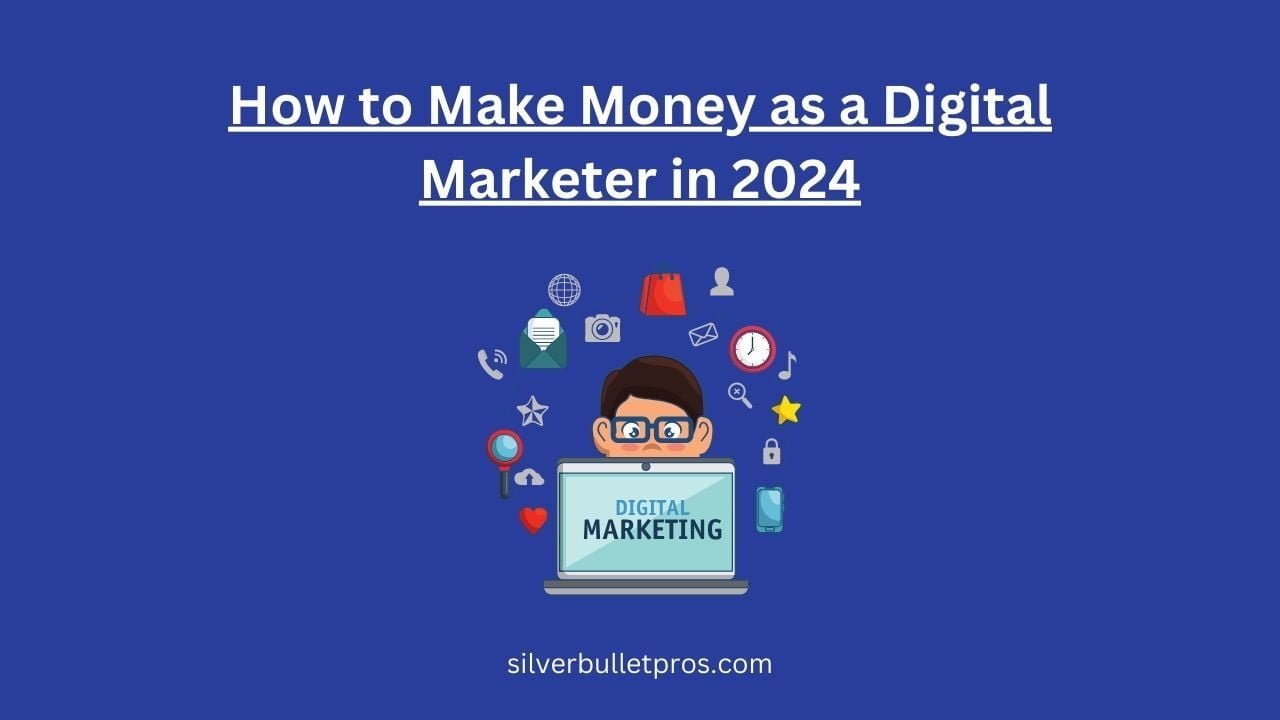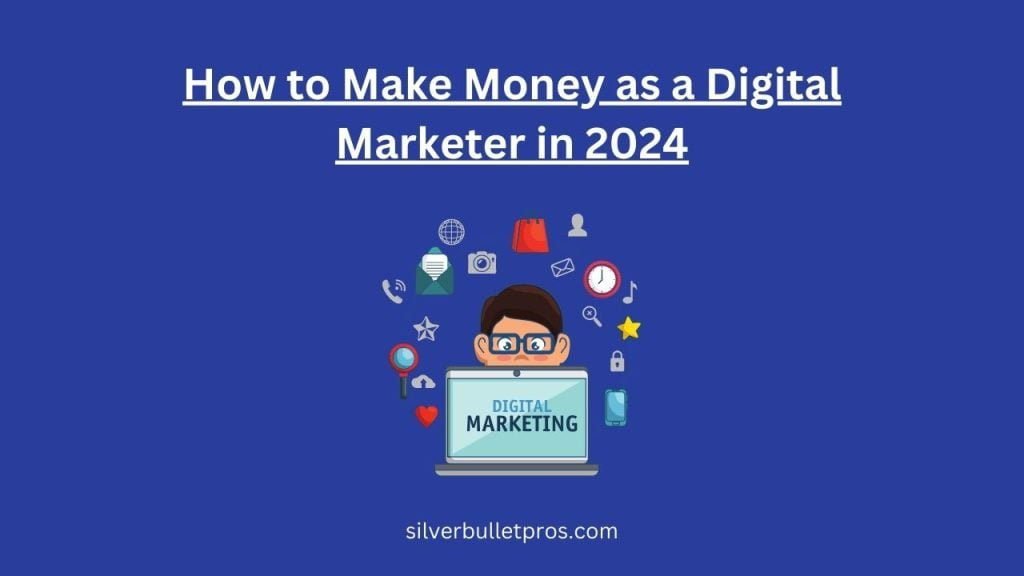

Digital marketing is the strategic promotion of products, services, or brands through various online channels and digital technologies. It encompasses a wide range of tactics and techniques aimed at reaching and engaging target audiences across digital platforms.
To elaborate, digital marketing involves the use of websites, social media platforms, search engines, email, mobile apps, and other digital channels to connect with potential and existing customers. It leverages data-driven insights to create, optimize, and deliver targeted and personalized marketing messages that resonate with specific audience segments.
How to Make Money as a Digital Marketer in 2024
From freelancing to starting your own agency, there are numerous ways to capitalize on your digital marketing skills and expertise. In this comprehensive guide, we'll delve into the world of digital marketing, exploring what it is, why it's important, how to become a digital marketer, the different types of digital marketing, and ultimately, how to turn your passion for marketing into a profitable venture in 2024.
What Is Digital Marketing?
Digital marketing encompasses all marketing efforts that utilize electronic devices and the internet. It involves leveraging various digital channels such as search engines, social media, email, and websites to connect with current and prospective customers. Unlike traditional marketing, digital marketing allows for precise targeting, real-time analytics, and personalized messaging, making it a highly effective and efficient way to reach your target audience.
Why Is Digital Marketing Important?
In today's digital-centric world, having a strong online presence is essential for businesses to succeed. Digital marketing offers businesses unparalleled reach and visibility, allowing them to connect with customers on a global scale. Moreover, digital marketing is cost-effective, enabling businesses of all sizes to compete on a level playing field. By leveraging digital marketing strategies, businesses can increase brand awareness, generate leads, drive sales, and ultimately, maximize their ROI.
How to Become a Digital Marketer
Becoming a digital marketer requires a combination of education, skills, and experience. While there is no one-size-fits-all path to success in digital marketing, there are several steps you can take to kickstart your career. These include acquiring relevant certifications, gaining hands-on experience through internships or freelance projects, and staying up-to-date with the latest industry trends and technologies.
What Are the Different Types of Digital Marketing?
Digital marketing encompasses a wide range of disciplines, each with its own unique strategies and tactics. Some of the most common types of digital marketing include:
Search Engine Optimization (SEO)
SEO involves optimizing websites and content to improve their visibility and ranking on search engine results pages (SERPs). By optimizing for relevant keywords and creating high-quality content, businesses can attract organic traffic and increase their online visibility.
Search Engine Marketing (SEM)
SEM involves promoting websites by increasing their visibility in search engine results pages through paid advertising. This typically involves running pay-per-click (PPC) campaigns on platforms like Google Ads and Bing Ads.
Social Media Marketing
Social media marketing involves leveraging social media platforms such as Facebook, Instagram, Twitter, and LinkedIn to connect with audiences, build brand awareness, and drive engagement. It encompasses a variety of strategies, including organic posting, paid advertising, and influencer partnerships.
Content Marketing
Content marketing involves creating and distributing valuable, relevant, and consistent content to attract and retain a clearly defined audience. This can include blog posts, articles, videos, infographics, and more.
Email Marketing
Email marketing involves sending targeted messages to a list of subscribers with the goal of driving engagement, nurturing leads, and promoting products or services. It's an effective way to build relationships with customers and drive sales.
Affiliate Marketing
Affiliate marketing involves partnering with other businesses or individuals to promote products or services in exchange for a commission. Affiliates earn a commission for each sale or lead they generate through their promotional efforts.
Paid Advertising
Paid advertising involves paying for ad placement on various digital platforms, such as search engines, social media, and websites. This can include display ads, video ads, sponsored content, and more.
How to Make Money as a Digital Marketer
Once you've honed your digital marketing skills, there are several ways to monetize your expertise and turn your passion into profit. Some of the most common avenues include:
Freelance Digital Marketing
Freelancing offers flexibility and autonomy, allowing you to work with multiple clients on a project basis. As a freelance digital marketer, you can offer a range of services, including SEO, social media management, content creation, and more.
Start a Digital Marketing Agency
If you have entrepreneurial ambitions, starting your own digital marketing agency can be a lucrative venture. By assembling a team of skilled professionals and offering comprehensive digital marketing services, you can attract clients and scale your business over time.
Get a Job as a Digital Marketer
Many businesses are looking to hire skilled digital marketers to help them navigate the complexities of online marketing. Whether you're interested in working for a large corporation, a small startup, or somewhere in between, there are ample opportunities for digital marketers across industries.
What Are the Skills Needed to Be a Successful Digital Marketer?
To excel in digital marketing, you'll need a diverse set of skills spanning creativity, analytical thinking, and technical know-how. Some essential skills for digital marketers include:
- Analytical Skills: Ability to analyze data, interpret metrics, and derive actionable insights from marketing campaigns.
- Creativity: Capacity to think outside the box, develop innovative strategies, and create engaging content that resonates with audiences.
- Communication Skills: Strong written and verbal communication skills are crucial for conveying your message effectively and engaging with customers.
- Technical Proficiency: Familiarity with digital marketing tools and platforms, such as Google Analytics, Facebook Ads Manager, and email marketing software.
- Adaptability: Willingness to adapt to changing trends, algorithms, and technologies in the ever-evolving digital landscape.
What Are the Challenges of Digital Marketing?
While digital marketing offers many benefits, it also presents its fair share of challenges. Some common challenges include:
- Competition: The digital marketing space is highly competitive, making it challenging to stand out from the crowd and capture the attention of your target audience.
- Algorithm Changes: Search engine and social media algorithms are constantly evolving, requiring marketers to stay abreast of changes and adjust their strategies accordingly.
- Content Saturation: With the proliferation of content online, cutting through the noise and capturing audience attention has become increasingly difficult.
- Measuring ROI: Determining the effectiveness of digital marketing efforts and accurately measuring ROI can be challenging, especially when dealing with complex attribution models and multiple touchpoints.
What Is the Future of Digital Marketing?
The future of digital marketing is bright, with continued growth and innovation on the horizon. Some emerging trends shaping the future of digital marketing include:
What Are the Trends in Digital Marketing?
- AI and Machine Learning: AI-powered tools and algorithms are revolutionizing digital marketing, enabling marketers to personalize content, automate processes, and optimize campaigns with greater precision.
- Voice Search Optimization: With the rise of voice-activated devices like smart speakers and virtual assistants, optimizing content for voice search is becoming increasingly important for marketers.
- Video Marketing: Video content continues to dominate online consumption, with platforms like YouTube, TikTok, and Instagram Reels driving engagement and conversions.
- Augmented Reality (AR) and Virtual Reality (VR): AR and VR technologies are creating immersive brand experiences, allowing marketers to engage audiences in new and innovative ways.
What are the key skills needed to succeed as a digital marketer in 2024?
To succeed as a digital marketer in 2024, you need strong analytical skills, content creation abilities, social media expertise, SEO knowledge, paid advertising proficiency, marketing automation skills, project management abilities, adaptability, creative thinking, and a commitment to continuous learning.
What are some trending monetization strategies for digital marketers this year?
Some trending monetization strategies for digital marketers in 2024 include freelancing, starting a digital marketing agency, influencer marketing, affiliate marketing, and offering online courses or consulting services.
How can I leverage emerging technologies to boost my earnings as a digital marketer?
To boost your earnings as a digital marketer, you can leverage emerging technologies like artificial intelligence (AI), machine learning (ML), augmented reality (AR), virtual reality (VR), voice search optimization, and chatbots to offer cutting-edge services and stay ahead of the competition.
What are the most lucrative niches for digital marketers in 2024?
Some of the most lucrative niches for digital marketers in 2024 include e-commerce, healthcare, finance, technology, and any industry that requires strong online presence and digital marketing strategies.
Are there any unique opportunities or challenges facing digital marketers in the current landscape?
Digital marketers in 2024 face opportunities like increased demand for personalization, omnichannel experiences, and data-driven marketing. Challenges include navigating privacy regulations, ad fatigue, intense competition, and the need for continuous upskilling to keep up with rapidly evolving technologies and trends.